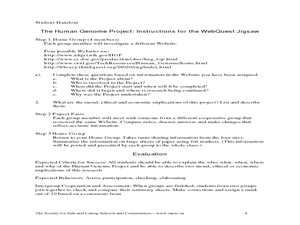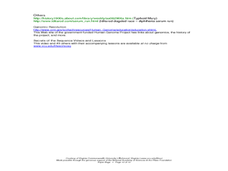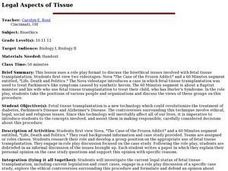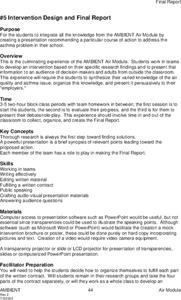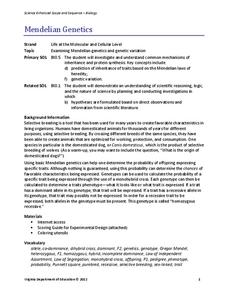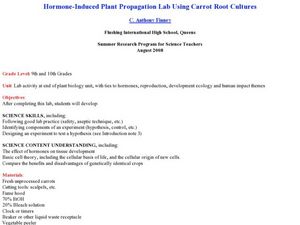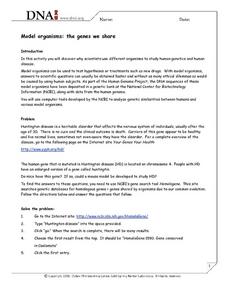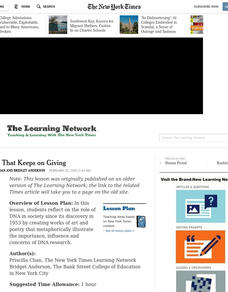Curated OER
The Human Genome Project: WebQuest Jigsaw
Twelfth graders research facts about the Human Genome Project. In this biology lesson, 12th graders brainstorm on the pros and cons of this project. They complete the jigsaw puzzle and present their findings in class.
Curated OER
The Secrets of the Sequence
Students explore genetics using a series of selected videos. For this biology lesson series, students study the different advances in life sciences. They research the pros and cons of genetic research.
Curated OER
STS Biology - Teaching Controversial Topics
Each of the three activities submitted presents difficult science topics in the context of the human experience. The activities focus on real-world problems, which have science components, from the students' perspectives.
Curated OER
Webbing out Electricity
Fourth graders identify electricity as a form of energy that is associated with common household products. They utilize technology as an aid in which they can graphically organize their thoughts.
Curated OER
Ship of Gold
Learners research the events that were taking place in the U.S. during the time period when the SS Central America sank, and explore the adventurous, innovative, and individualistic traits that often define the American spirit.
Curated OER
Yeast Cells and Their Environment
Students create their own experiment in which they have yeast cells growing in liquid environments. They examine the relationship between humans and microorganisms. They also practice using the scientific method.
Curated OER
Scientific Approach to Forest Management
Students use wireless laptop computers to collect, store, communicate, and organize data from the 1999 Jasper Fire area. They collect data in the field and compare it to student-collected data from prior years to develop conclusions...
Curated OER
Legal Aspects of Tissue
Students research their role and develop a group position on the appropriate use of fetal tissue transplantation. They engage in role play discussion focused on the case study.
Curated OER
Ask the Antlion
Young scholars observe and examine the life cycle of antlions, recording their observations of the live insects in a journal. They view an antlion on a video microscope, draw the body parts, and replicate their experiment at home.
Curated OER
Intervention Design and Final Report
Students engage in series of studies having to do with the Ambient Air Module. They create a presentation to recommend a solution for the asthma problem experienced by students at school. The rubric is found at the end of the lesson plan...
Curated OER
Mendelian Genetics
Students work collaboratively in small learning groups to create some representation of an aspect of Mendelian genetics in this review lesson for the Biology classroom. The lesson includes task cards for each small group and a...
Curated OER
What Is It; Whose Is It; Where Did It Come From?
Learners discover which elements are most threatening to outdoor sculptures. In groups, they determine the steps that are needed to preserve them. They locate and assess the condition of those sculptures in their local community. They...
Curated OER
Designing Our Own Inventions
Third graders use research from a previous lesson to design their own inventions. In groups, they brainstorm a product they would like to see built and share them with the class. They must explain how each one would serve a purpose or...
Curated OER
Butterfly Life Cycle
Second graders engage in a lesson that covers the life cycle of a butterfly. They use the Kidpix software to create a drawing of the life cycle with the help of an illustration given by the teacher as a guide. Then students discuss the...
Curated OER
How Green Are We?
Learners identify and interpret the importance of energy efficiency in connection with air pollution. They communicate with families and peers about ways to more effectively contribute to the reduction of air pollution. Finally,...
National First Ladies' Library
World Starvation
Students investigate the concept of world starvation and some of the organizations that are founded in order to help solve the problem. They conduct research using a variety of resources. The information is used in order to conduct class...
Curated OER
Bioethics and Humans
Young scholars evaluate "humanity" and conditions associated with it. In this activity lesson students take on issues and construct their own limitations by defining the "human" condition.
Curated OER
Hormone-Induced Plant Propagation Lab using Carrot Root Cultures
Learners evaluate the importance of hormones in living things. For this biology lesson, students experiment on carrots to differentiate how humans and plants reproduce. They collect data from experiment to answer analysis questions.
Curated OER
Model Organisms: The Genes We Share
In this genetics worksheet, students access a website to learn about how human genes mutate to cause heritable disorders such as Huntington disease. Students use the information on this website to complete 12 short answer questions.
Curated OER
Insect Collection
Students investigate about various biological aspects of life, while examining desert insect species. They see the diverse range of species that live in the desert, despite the apparent lack of life in the desert. students tocomprehend...
Curated OER
Preserve is the Word
Young scholars investigate a list of archaeological ethical questions. They select a question/issue and design a 3-minute (maximum) PSA to persuade the public to agree with their idea. They conduct research or interviews with experts to...
Curated OER
Faith-Based Initiatives: Separation of Church and State
Students examine the role of religion in everyday life. In this religion and ethics lesson, students investigate the use of government funds to support faith-based initiatives. The lesson calls for students to conduct research, watch...
Curated OER
The Gift That Keeps on Giving
Students reflect on the role of DNA in society since its discovery in 1953 by creating works of art and poetry that metaphorically illustrate the importance, influence and concerns of DNA research.
Alabama Learning Exchange
We Can Dig It!
Third graders understand the process by which fossils and rocks are excavated. In this fossil and rock lesson, 3rd graders explore the job of the paleontologist in a podcast.
